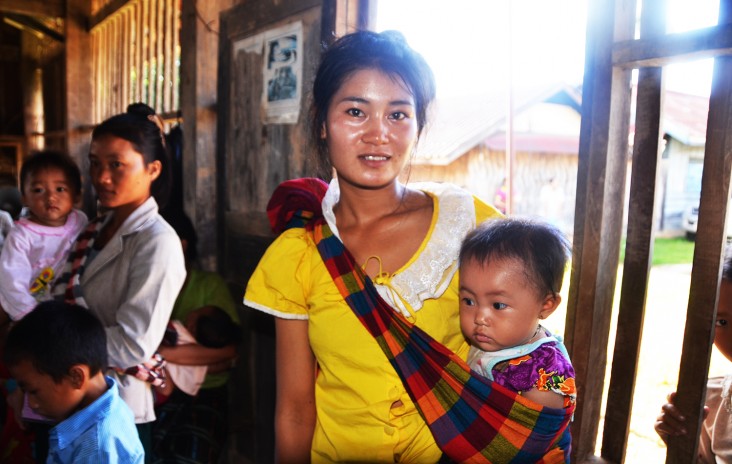Speeches Shim

October 2016—Inside Kokmuang Health Center, a modest wooden structure in Donmai village in Luang Namtha, Laos, USAID-funded nutrition commodities are being distributed to patiently waiting mothers and their children by local health staff with support from the United Nations Children’s Fund (UNICEF). This activity is part of the regular health outreach efforts performed in the northwest of the country.
“Women who are pregnant particularly need iron, which they should start from the first three months of pregnancy to aid the baby’s brain development and healthy growth,” said Dr. Sengpasert Bunthanvong of Luang Namtha’s Provincial Hygiene and Health Promotion Department. “It also protects mothers from blood shortage or excessive blood loss after giving birth.”
One of the key goals is to keep mothers healthy and help them deliver healthy babies by providing nutrition commodities such as iron, folic acid, vitamin A and deworming tablets. In Laos, around 35 percent of children under 5 are stunted—or too short for their age. Stunting also affects the development of the brain, which can have a detrimental, irreversible impact on a child’s cognitive ability. In addition, almost 10 percent of Lao children are estimated to be acutely malnourished.
The nutrition commodities make a crucial difference to the lives of mothers and the health of their children. Donmai, a small village near the borders with China and Myanmar, is a rural, mountainous setting where these services are an important, preventative measure to help ensure healthy births and healthy mothers.
“During my pregnancy, the doctor gave me iron supplements,” said Lin, a young mother in the village. “I took them on a regular basis every morning and evening and the food that they gave me, one pack per day. After taking it, I felt very good and healthier, even after just having my new baby. My child’s weight at birth was the expected weight for a newborn baby and healthy too.”
In Laos, USAID’s funding for nutrition supplements for pregnant women and those with newborns is ultimately helping to give children in the country the best chance at reaching their fullest possible potential. It also gives the country the opportunity to unlock its fullest economic potential in the generations to come.
“I want my two kids to grow up healthy and not catch diseases,”said 18-year-old Yailao, who has two children. “They give me this vitamin to take. I have taken it for the past three months of my pregnancy, and it made me healthy. If I didn’t take this, I believe I wouldn’t stay this healthy.”
Nearly 2 million people have benefited from the project. As part of its continuing commitment to improve the health and nutrition of the Lao population, USAID and Save the Children will carry out the Nurture project in Laos over the next three years. The USAID project is designed to reduce stunting in young children in targeted areas of Laos by improving nutrition and water, sanitation and hygiene practices.
LINKS
Follow @USAIDAsia, on Facebook, on Flickr, on YouTube

Comment
Make a general inquiry or suggest an improvement.